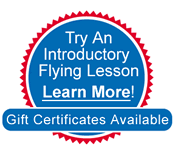|
|
.
.
Questions about Flying Lessons?
Call 631-807-1373
|
|
How do I Start the Process of
Becoming a Pilot?
Whether you have made up your mind to become a pilot, or if you
are just starting your research, the summary below will give you
a good idea of the general process and Requirements to Become a
Pilot.
|
|
Brief
Summary of the Requirements...
After you have logged the required Aeronautical Experience,
Aeronautical Knowledge (and have passed the computer
based knowledge test), received both a Student Pilot
Certificate and an FAA Medical Certificate,
and you are safe and competent flying the airplane,
you will be eligible to take the FAA Practical Exam
for your Private Pilot Certificate (see more detail
on each of these steps below).
If you want to work as a pilot, you can then upgrade
your pilot certificate to a Commercial Pilot Certificate.
Also, you can add various ratings to your pilot certificate,
such as an instrument rating (so you can fly in the
clouds), multi-engine airplanes, or various type ratings
to fly larger aircraft and jets.
|
|
|
Details of the Requirements:
Aeronautical Experience -
(Flight Training in the airplane)
The FAA requires at least 40 hours of logged flight time. This required
flight time includes both time with an instructor (dual time), and
time flying the plane by yourself (solo time). The total number
of flight hours you will need varies from person to person - the
national average is 60-70 hours. The number of actual flight hours
is not the determining factor... you must be safe and proficient
in the airplane.
Aeronautical Knowledge -
(often called Ground Training or Ground School)
Controlling the airplane is only a part of the process. You must
also have a strong understanding of all of the topics listed below
in order to be a safe pilot. All of our ground training is done
on a one-on-one basis with your instructor. If you are motivated,
you will be able to cover most of the following topics on your own.
After, your ground school is complete, you will have to pass a Computer
Based Knowledge Test at an FAA testing center. A passing grade
of 70% or better is required, before you are eligible to schedule
your practical exam with the FAA.
|
- Aerodynamics
- Airplane Systems
- Airports and Airspace
- Aviation
Regulations
- Airplane Performance
- Aeromedical Factors
- Weather
- Navigation
- Flight Planning
|
|
Student Pilot Certificate
You are not required to have a Student Pilot Certificate prior
to starting your Flying Lessons, but you must have this step completed
before you will be able to start the solo portion of your flight
training. Aviation Medical Examiners no longer issue Student Pilot
Certificates.
The application process in now completed online on the FAA's
IACRA website. It is a multi-step process that is best completed
while you and your instructor are together at a computer. Both of
you will need to login and digitally sign the application. After
you finish the online application, if takes about 2-3 weeks for
you to receive your Certificate in the mail.
|
|
FAA Medical Certificate
You are not required to have an FAA Medical Exam prior to starting
your Flying Lessons, but you must have this step completed before
you will be able to start the solo portion of your flight training.
If you have any "hiccups" in your medical history, it
is a good idea to complete this process as soon as you have decided
to commit yourself to becoming a pilot.
The first step is to fill out an online application on the FAA's
website, where you will submit information on your medical history.
The site can be found here: FAA
MEDXPRESS.
After you have completed the online process, you will receive an
ID number. You can then call an Aviation Medical Examiner to schedule
your medical exam.
Find an Aviation Medical Examiner (AME) - on
the FAA's website
Find an Aviation Medical Examiner (AME) - www.flightphysical.com
All medical questions should be referred an Aviation Medical Examiner,
but generally only more serious conditions, such as heart trouble,
diabetes, epilepsy, or psychological problems would disqualify you.
You can learn more at www.flightphysical.com.
|
|
Where to start...
Take an introductory flying lesson! We offer a range of introductory
options to help get you started (learn
more), all of which will give you the opportunity to actually
fly the plane. More importantly, you will get to see our operation
first hand, and ask important questions about cost, scheduling flexibility,
experience of our flight instructors, and our perfect safety record
since we started over 21 years ago!
After your introductory lesson, we can then enroll you in our program!
You will be provided with a copies of the airplane checklists, our
flight training syllabus, safety/security procedures, and our attendance
policy. You will also be given exclusive access to a number of other
teaching aids we have developed to help you learn how to fly our
specific airplanes and from our actual airport!
- Cessna 172 Preflight Inspection Guide
- Radio Communications Guide
- Cessna 172 Maneuvers Manual
- Cessna 172 Traffic Pattern Guide
And as you progress through your flying lessons, you will receive
a number of other tools and checklists to help ensure your training
is complete and everything is covered.
|
|
Learn more
about All Airplane Courses We Offer:
|
|
|
|
|
|
|
|
|
| |
|
|
Feel free to give us a call anytime so we may answer any of your
questions!
Call 631-807-1373... ask to speak with Ben or David
|
|
|

